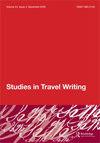寻找共同的表达:卡雷尔Čapek的旅行写作和欧洲的想象地理
Q2 Arts and Humanities
引用次数: 0
摘要
Kiöping反对传统中司空见惯的东西,发现工作不足。与此同时,译文也很蹩脚:过度依赖带有“get”的动词表达,犯了错误(例如不及物动词“tell”,90),它可能反映了一个蹩脚的源文本,但没有任何解释翻译程序或策略的注释(除了一篇关于测量和货币的冗长论文),这让读者再次产生了怀疑。简而言之,Kiöping以华丽的形式出现在英语中。他的著作具有潜在的价值,因为它们可能从瑞典的独特优势中揭示欧洲在东方的活动,瑞典在17世纪中叶对欧洲事务的影响很容易被忽视。遗憾的是,这个版本提出的问题比它回答的要多。本文章由计算机程序翻译,如有差异,请以英文原文为准。
In Search of a Shared Expression: Karel Čapek’s Travel Writing and Imaginative Geography of Europe
Kiöping against what was commonplace in the tradition and found the work wanting. The translation, meanwhile, is clunking: over-reliant on verbal locutions with “get”, guilty of solecisms (e.g. intransitive “tell”, 90), it may reflect a clunking source text, but the absence of any note explaining translation procedures or strategies (except a lengthy disquisition on measurements and currency) leaves this reader once again in doubt. In short, Kiöping has arrived in English in magnificent form. His writings are of potential interest for the light they may throw onto European activity in the Orient from the distinctive vantage of Sweden, a nation whose influence on European affairs in the central decades of the seventeenth century is easily overlooked. The pity is that this edition raises more questions than it answers.
求助全文
通过发布文献求助,成功后即可免费获取论文全文。
去求助
来源期刊

Studies in Travel Writing
Arts and Humanities-Literature and Literary Theory
CiteScore
0.40
自引率
0.00%
发文量
13
期刊介绍:
Founded in 1997 by Tim Youngs, Studies in Travel Writing is an international, refereed journal dedicated to research on travel texts and to scholarly approaches to them. Unrestricted by period or region of study, the journal allows for specific contexts of travel writing to be established and for the application of a range of scholarly and critical approaches. It welcomes contributions from within, between or across academic disciplines; from senior scholars and from those at the start of their careers. It also publishes original interviews with travel writers, special themed issues, and book reviews.
 求助内容:
求助内容: 应助结果提醒方式:
应助结果提醒方式:


